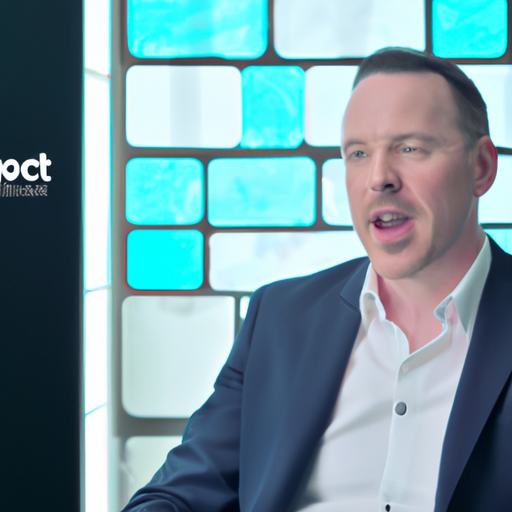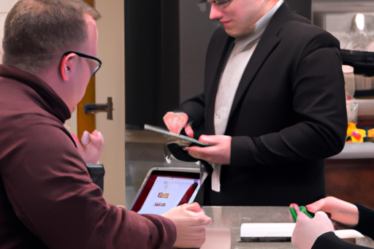
The Role of a Chief Revenue Officer (CRO) in the Hospitality Industry
Interview with John Seaton, Chief Revenue Officer (CRO) at Cendyn in HITEC Toronto
Today, we have the pleasure of speaking with John Seaton, the Chief Revenue Officer (CRO) at Cendyn, a leading provider of cloud-based software and services for the hospitality industry. John has over 20 years of experience in the industry and has held various leadership positions throughout his career. In this interview, we will be discussing the role of a Chief Revenue Officer in the hospitality industry and how it has evolved over the years.
To start off, John explains that the role of a Chief Revenue Officer is to oversee all revenue-generating functions within a company. This includes sales, marketing, and revenue management. The CRO is responsible for driving revenue growth and ensuring that the company meets its financial goals. In the hospitality industry, this is particularly important as hotels and resorts rely heavily on revenue from bookings and other services.
When asked about the changes he has seen in the role of a CRO over the years, John highlights the increasing importance of data and technology. In the past, revenue management was largely based on intuition and experience. However, with the advent of technology and the availability of data, revenue management has become much more data-driven. CROs now have access to a wealth of information that can help them make more informed decisions and optimize revenue.
John also emphasizes the importance of collaboration in the role of a CRO. In the past, revenue management, sales, and marketing were often siloed departments within a company. However, in today’s fast-paced and competitive industry, it is crucial for these departments to work together seamlessly. The CRO plays a key role in fostering collaboration and ensuring that all revenue-generating functions are aligned towards a common goal.
When asked about the challenges he faces as a CRO, John mentions the ever-changing nature of the industry. The hospitality industry is constantly evolving, with new technologies, trends, and customer preferences emerging all the time. As a CRO, it is important to stay ahead of these changes and adapt quickly. This requires a deep understanding of the industry and a willingness to embrace innovation.
In terms of advice for aspiring CROs, John emphasizes the importance of being customer-centric. The hospitality industry is all about providing exceptional experiences for guests, and the CRO plays a crucial role in ensuring that revenue-generating functions are aligned towards this goal. By putting the customer at the center of decision-making, CROs can drive revenue growth and create long-term success for their companies.
In conclusion, the role of a Chief Revenue Officer in the hospitality industry is multifaceted and ever-evolving. CROs are responsible for driving revenue growth and ensuring that the company meets its financial goals. With the increasing importance of data and technology, CROs now have access to a wealth of information that can help them make more informed decisions. Collaboration and adaptability are also key traits for successful CROs in today’s fast-paced industry. By staying customer-centric and embracing innovation, CROs can drive revenue growth and create long-term success for their companies.
Strategies for Revenue Optimization in the Hotel Sector

Interview with John Seaton, Chief Revenue Officer (CRO) at Cendyn in HITEC Toronto
Today, we had the pleasure of sitting down with John Seaton, the Chief Revenue Officer (CRO) at Cendyn, a leading provider of hotel CRM and revenue management solutions. With over 20 years of experience in the hospitality industry, John has a wealth of knowledge when it comes to revenue optimization strategies in the hotel sector.
When asked about the key strategies for revenue optimization, John emphasized the importance of data-driven decision making. He explained that hotels have access to a vast amount of data, from guest preferences to booking patterns, and leveraging this data is crucial for maximizing revenue. By analyzing this data, hotels can identify trends and patterns that can help them make informed decisions about pricing, inventory management, and marketing strategies.
John also stressed the significance of personalization in revenue optimization. He believes that in today’s competitive market, hotels need to go beyond offering a one-size-fits-all experience to their guests. Instead, they should focus on tailoring their offerings to meet the unique needs and preferences of each individual guest. By personalizing the guest experience, hotels can not only increase guest satisfaction but also drive revenue through upselling and cross-selling opportunities.
Another strategy that John highlighted is the importance of collaboration between revenue management and marketing teams. He explained that these two departments often work in silos, with revenue management focusing on pricing and inventory management, while marketing focuses on promotions and campaigns. However, by working together and sharing data and insights, these teams can create more effective strategies that drive both revenue and brand loyalty.
When asked about the role of technology in revenue optimization, John was quick to point out its significance. He explained that technology has revolutionized the way hotels operate, allowing them to automate processes, streamline operations, and gain real-time insights into their performance. From revenue management systems to customer relationship management (CRM) platforms, technology plays a crucial role in helping hotels optimize their revenue.
John also discussed the importance of staying ahead of the curve when it comes to technology. He emphasized the need for hotels to constantly evaluate and adopt new technologies that can help them stay competitive in the market. Whether it’s implementing artificial intelligence (AI) to automate pricing decisions or leveraging data analytics to gain deeper insights into guest behavior, hotels need to embrace technology to drive revenue optimization.
In conclusion, revenue optimization in the hotel sector requires a data-driven approach, personalization, collaboration between revenue management and marketing teams, and the adoption of technology. By leveraging data, personalizing the guest experience, collaborating across departments, and embracing technology, hotels can maximize their revenue and stay ahead in today’s competitive market. It was a pleasure speaking with John Seaton, and we thank him for sharing his insights on revenue optimization strategies in the hotel sector.
Insights from an Interview with John Seaton, CRO at Cendyn in HITEC Toronto
I recently had the opportunity to sit down with John Seaton, the Chief Revenue Officer (CRO) at Cendyn, during the HITEC Toronto conference. As a leading provider of cloud-based software and services for the hospitality industry, Cendyn has been at the forefront of innovation in the sector. With his extensive experience in revenue management and sales, John was the perfect person to shed light on the current trends and challenges in the industry.
During our conversation, John emphasized the importance of data-driven decision making in the hospitality industry. He explained that with the increasing amount of data available, it is crucial for hotels to leverage this information to optimize their revenue strategies. By analyzing guest preferences, booking patterns, and market trends, hotels can make more informed decisions about pricing, promotions, and distribution channels.
John also highlighted the growing role of technology in the industry. He noted that technology has revolutionized the way hotels operate, from online booking platforms to mobile check-in and keyless entry systems. According to John, hotels that embrace technology and provide a seamless digital experience for their guests are more likely to succeed in today’s competitive market.
In addition to technology, John emphasized the importance of personalized guest experiences. He explained that guests are increasingly seeking unique and tailored experiences, and hotels need to adapt to this demand. By leveraging data and technology, hotels can personalize their offerings and create memorable experiences for their guests. From personalized recommendations based on guest preferences to customized amenities and services, personalization is key to attracting and retaining guests.
When asked about the challenges facing the industry, John mentioned the increasing competition from alternative accommodation providers such as Airbnb. He acknowledged that these platforms have disrupted the traditional hotel industry and forced hotels to rethink their strategies. However, he also saw this as an opportunity for hotels to differentiate themselves by offering unique experiences and personalized services that cannot be replicated by alternative accommodation providers.
John also discussed the importance of collaboration and partnerships in the industry. He explained that hotels can no longer operate in isolation and need to work together with other stakeholders, such as technology providers and online travel agencies, to drive innovation and growth. By collaborating with these partners, hotels can leverage their expertise and resources to enhance their offerings and reach a wider audience.
In conclusion, my interview with John Seaton provided valuable insights into the current trends and challenges in the hospitality industry. From the importance of data-driven decision making and technology to the growing demand for personalized guest experiences, hotels need to adapt to these changes to stay competitive. By embracing innovation, collaborating with partners, and focusing on delivering exceptional guest experiences, hotels can thrive in today’s dynamic market.


